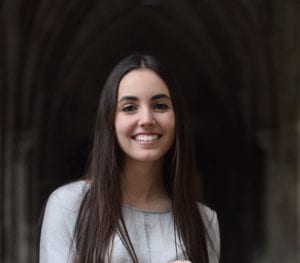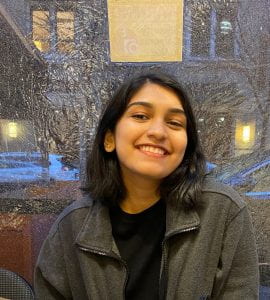 Mariah Hawes, M.A. is a fifth-year graduate student. She graduated from James Madison University in 2015 and completed a M.A. in psychology at Teachers College Columbia University in 2017. Mariah studies risk for internalizing psychopathology across different timescales (e.g., hours, days, months, years) and using a range of advanced quantitative methods. She is particularly excited about the potential of intensive longitudinal methods (EMA/ESM, daily diary) to capture everyday patterns important to psychological functioning (e.g., emotions, behaviors, sleep, exercise). Mariah Hawes, M.A. is a fifth-year graduate student. She graduated from James Madison University in 2015 and completed a M.A. in psychology at Teachers College Columbia University in 2017. Mariah studies risk for internalizing psychopathology across different timescales (e.g., hours, days, months, years) and using a range of advanced quantitative methods. She is particularly excited about the potential of intensive longitudinal methods (EMA/ESM, daily diary) to capture everyday patterns important to psychological functioning (e.g., emotions, behaviors, sleep, exercise). |
 Jamilah Silver, M.A. is a fourth-year graduate student. She graduated from Northwestern University in 2019. Jamilah is interested in disentangling the heterogeneity of irritability throughout early childhood and adolescence, investigating the characterization of early childhood depression, and investigating preschool psychopathology with the aim to better understand children’s mental health within the context of the environment in which they live. Jamilah Silver, M.A. is a fourth-year graduate student. She graduated from Northwestern University in 2019. Jamilah is interested in disentangling the heterogeneity of irritability throughout early childhood and adolescence, investigating the characterization of early childhood depression, and investigating preschool psychopathology with the aim to better understand children’s mental health within the context of the environment in which they live. |
 Alexander Grieshaber, B.S., is a third-year graduate student. He graduated from Binghamton University in 2017. He is interested in studying how individual differences in personality, ERPs, and other measures interact, and how these interactions lead to the development, maintenance, and severity of transdiagnostic psychopathology symptoms. He is particularly interested in how trait-like mechanisms, coupled with life stress, may confer recurrent and persistent psychopathology. Alexander Grieshaber, B.S., is a third-year graduate student. He graduated from Binghamton University in 2017. He is interested in studying how individual differences in personality, ERPs, and other measures interact, and how these interactions lead to the development, maintenance, and severity of transdiagnostic psychopathology symptoms. He is particularly interested in how trait-like mechanisms, coupled with life stress, may confer recurrent and persistent psychopathology. |
 Alison Calentino, B.A. is a second-year graduate student. She graduated from the University of Chicago in 2018. Alison is interested in studying how environmental factors and individual differences in affective processing influence the development and course of depression in adolescents and emerging adults. She is also interested in the role that stressful life events play in these relationships. Alison Calentino, B.A. is a second-year graduate student. She graduated from the University of Chicago in 2018. Alison is interested in studying how environmental factors and individual differences in affective processing influence the development and course of depression in adolescents and emerging adults. She is also interested in the role that stressful life events play in these relationships. |
 Thomas Harrison, M.S. is a first-year graduate student. He graduated from Albright College in 2018 (B.A.) and Saint Joseph’s University in 2020 (M.S.). Thomas is interested in understanding how adolescents and adults develop internalizing psychopathology, such as depression, and how stress, adversity, and cognitive vulnerabilities can interact in the development, maintenance, and exacerbation of internalizing psychopathology. Thomas plans to examine these research questions through a biopsychosocial lens with a particular focus on the role that stressful life events play in depression. Thomas Harrison, M.S. is a first-year graduate student. He graduated from Albright College in 2018 (B.A.) and Saint Joseph’s University in 2020 (M.S.). Thomas is interested in understanding how adolescents and adults develop internalizing psychopathology, such as depression, and how stress, adversity, and cognitive vulnerabilities can interact in the development, maintenance, and exacerbation of internalizing psychopathology. Thomas plans to examine these research questions through a biopsychosocial lens with a particular focus on the role that stressful life events play in depression. |
|
|
|
|
|
 Daniel N. Klein, Ph.D. is the Principle Investigator of the study. He received his doctoral degree in Psychology from the State University of New York at Buffalo in 1983, and is currently a Professor of Psychology at Stony Brook University.
Daniel N. Klein, Ph.D. is the Principle Investigator of the study. He received his doctoral degree in Psychology from the State University of New York at Buffalo in 1983, and is currently a Professor of Psychology at Stony Brook University. Dawna Shimabukuro, M.Ed. is a Research Support Specialist for the study. She received her Master’s degree in Educational Psychology from the University of Washington, and she graduated from Stony Brook University with a B.A. in Psychology.
Dawna Shimabukuro, M.Ed. is a Research Support Specialist for the study. She received her Master’s degree in Educational Psychology from the University of Washington, and she graduated from Stony Brook University with a B.A. in Psychology. Rakshitha Yelimineti, B.A., is a Research Support Specialist. She received her Bachelor’s degree in Psychology and Sociology from Stony Brook University in 2021. She is interested in examining the onset and development of anxiety and depression through a longitudinal lens. She aspires to get a PhD in Clinical Psychology in the near future
Rakshitha Yelimineti, B.A., is a Research Support Specialist. She received her Bachelor’s degree in Psychology and Sociology from Stony Brook University in 2021. She is interested in examining the onset and development of anxiety and depression through a longitudinal lens. She aspires to get a PhD in Clinical Psychology in the near future



